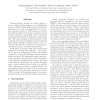Free Online Productivity Tools
i2Speak
i2Symbol
i2OCR
iTex2Img
iWeb2Print
iWeb2Shot
i2Type
iPdf2Split
iPdf2Merge
i2Bopomofo
i2Arabic
i2Style
i2Image
i2PDF
iLatex2Rtf
Sci2ools
106
click to vote
ICPP
2009
IEEE
2009
IEEE
Code Semantic-Aware Runahead Threads
Memory-intensive threads can hoard shared resources without making progress on a multithreading processor (SMT), thereby hindering the overall system performance. A recent promising solution to overcome this important problem in SMT processors is Runahead Threads (RaT). RaT employs runahead execution to allow a thread to speculatively execute instructions and prefetch data instead of stalling for a long-latency load. The main advantage of this mechanism is that it exploits memory-level parallelism under long latency loads without clogging up shared resources. As a result, RaT improves the overall processor performance reducing the resource contention among threads. In this paper, we propose simple code semantic based techniques to increase RaT efficiency. Our proposals are based on analyzing the prefetch opportunities (usefulness) of loops and subroutines during runahead thread executions. We dynamically analyze these particular program structures to detect when it is useful or not to...
Distributed And Parallel Computing | ICPP 2009 | Runahead Thread Execution | Runahead Threads | Shared Resources |
| Added | 23 May 2010 |
| Updated | 23 May 2010 |
| Type | Conference |
| Year | 2009 |
| Where | ICPP |
| Authors | Tanausú Ramírez, Alex Pajuelo, Oliverio J. Santana, Mateo Valero |
Comments (0)

